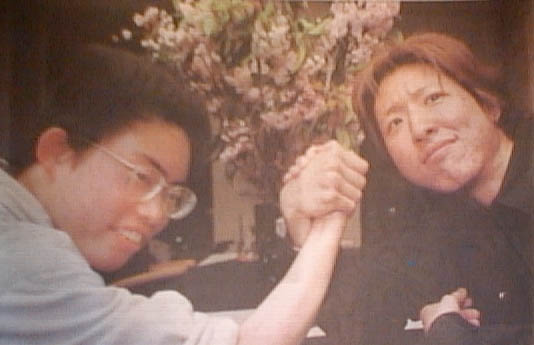|
press プレス |
The Asahi Shimbun
International Herald Tribune
The New York Times and The Washington Post
Saturday-Sunday, May 25-26, 2002
SEX CHANGE, LIFE CHANGE
He always knew
he was really a she
Japan's transgender people are opting for surgery to allow them to live in the gender they feel is their true identity.
By CHIE MATSUMOTO
![]()
Asahi Shimbun News Service
 Yu Tomita, right, and his friend are in the process of changing from female to male. Photo: Louis Templado |
Motoko Katayama (not her real name) lived all her life feeling distressed, until she finally got divorced a few years ago. She feels somewhat more liberated now, although she misses her 10-year-old daughter. Still, she feels, there are some things that her daughter is better off not knowing: Katayama is her father.
Katayama, in her 40s, has decided to change her body to match her true sexual identity, a choice she made after her ex-wife caught her putting on makeup one night after the family was asleep. Painting her face was one way to relieve stress for Katayama, a computer engineer who, on the outside, dressed and lived as a male.
"I think (my wife) had suspicions about what I was doing at night," Katayama says. "But when she pressed me with questions, all I could do was apologize and swear I would never do it again."
Katayama has been diagnosed as having gender identity disorder, a condition in which the person strongly identifies with the other sex and believes that they are "trapped in the wrong body." It is differentiated from transvestism, in which a person cross-dresses for sexual pleasure.
Katayama is awaiting approval for a sex change operation from the Saitama Medical School ethics committee, one of only two medical entities that consider such applications in Japan. In preparation, she is undergoing estrogen hormone therapy.
Despite the misconception that transgender people can only find work in the entertainment industry, Katayama has kept her full-time job at a major IT corporation. Her company accepted her identity change, but to make the transition easier, she transferred to another department in a different city.
With long hair, light makeup and artfully shaped eyebrows, Katayama says she finally feels comfortable with her body and her identity.
For hundreds of other transgender people who hope to lead ordinary lives, the March revelation by a famous female motorboat racer that she would now live as a man and have sex change surgery was welcome news.
Hiromasa Ando, 39, who raced successfully as a woman under the birth name Chinatsu Ando for 18 years, entered his first race earlier this month under his new identity. His "coming out" has been accepted by the motorboat racing federation, which said it would adapt its rules for him until he completes sex change surgery at Okayama University Hospital; he underwent a completed mastectomy in December.
"I was reborn," Ando told journalists at a news conference. "I am the happiest person on Earth today."
But not everything is going as well for other transgender people. Opting for a sex change is an agonizing decision for some.
The Eugenics Protection Law, enacted in 1948, prohibits surgery to render patients infertile without any medical justification. In 1969, the Tokyo District Court imposed a suspended sentence on a gynecologist for violating the law by performing sex change operations on three men.
Nearly three decades later, in 1997, the Saitama Medical School ethics committee established guidelines for sex change operations and conducted the first surgery in Japan in 1998. Since then, nine people at Saitama Medical School and five at Okayama University Hospital have been approved for surgery. At Saitama, three applications for a sex change are now under review, and this month the committee received a 13th application, said ethics committee chairman Toshio Yamauchi, who is vice-president of the Department of Neuropsychiatry at Saitama Medical School.
| `The situation has improved ... But it is still a difficult path for all of us. We can't even achieve normal happiness.' |
Demand for sex change surgery has increased since 1998, Dr. Yamauchi said. More than 350 patients diagnosed since then with gender identity dysphoria at gender clinics nationwide are receiving psychiatric counseling, he said. However, fewer than 50 will need the physical transformation. Others will be able to live satisfactorily with hormone therapy or counseling, he said.
While no statistics have been collected in Japan on people with gender identity dysphoria, the Japanese Society of Psychiatry and Neurology estimates there are anywhere from 2,200 to 7,000 such individuals, based on percentages in the United States.
To diagnose someone with gender identity disorder, the Saitama Medical School ethics committee stipulates that a team of doctors interview the patient and follow official guidelines written in 1997 and revised last month. A person must:
- Maintain a strong desire to live, act or dress as the opposite sex;
- Feel distress from living as his or her birth gender;
- Strongly dislike the physical attributes and functions of the birth gender and desire to have birth-gender sexual organs removed;
- Have had a continuous desire to change sex and have felt "trapped in the wrong gender" prior to reaching their mid-teens.
 Motorboat racer Hiromasa Ando Photo: Gen Hashimoto |
The revisions allow for applicants as young as 18, instead of 20 previously, and permit a mastectomy to be performed before hormone therapy begins.
Still, for some applicants, these efforts are too slow. In some instances, people have overdosed on hormone drugs in attempts to speed up a sex change, Yamauchi said. Failure to follow the safety guidelines led to the death of one man in February at an Osaka hospital after sex change surgery. The patient died from an accumulation of fluid in the lungs.
"Doctors must follow precise and careful steps to make a diagnosis leading to surgery," the Saitama doctor said. "A sex change has much to do with human dignity."
But physical transformation does not guarantee social acceptance. And Japan's family registry regulations complicate things: The Justice Ministry does not allow a person's gender to be changed in the family registry.
But that hasn't stopped actress Carrousel Maki, who broke ground 30 years ago by undergoing a sex change overseas. She was one of the first Japanese to publicly admit to a sex change. In an era when transgender people were considered "freaks," she completed the physical transformation in Morocco. Medical and other complications arose.
After Maki was arrested for possession of drugs in September, she was detained in a male ward for 41 days because her family registry still lists her as male.
Detained in a male jail
The police did accommodate her differences, however. Jail routine was adjusted to avoid any contact between Maki and the male detainees, she says. She remained in solitary confinement, and her cell was continually guarded.
 Carrousel Make, a male-to-female transgender actress, was incarcerated in a men's jail. Photo: Chie Matsumoto |
She refused to be strip-searched with male guards in the room. She ate alone and bathed alone behind a partition, instead of in groups with other inmates.
Yamauchi's ethics committee is working to modify the legal status of transgender people. The Saitama Medical School ethics committee and the Japanese Society of Psychiatry and Neurology last June jointly demanded the Justice Ministry revise the family registry law to allow gender revisions. Meanwhile, six people who have completed sex changes have requested a revision to their family registries in family courts in their home cities. A ministry spokesman said, however, the government has no plans to revise the law because that would open up a Pandora's box of related issues.
When a family registry lists a gender different from a person's appearance, life becomes complicated. Getting a passport, signing contracts for housing, securing a job or getting married become awkward, if not impossible. Many in the transgender community avoid visiting hospitals because they must show insurance cards, which specify their original gender.
Still, Maki thinks it's much easier these days in comparison with three decades ago, when society treated people like her as "monsters" or "perverts."
Medical treatment has opened the door, but it remains a baby step. Transgender individuals still experience discrimination. People on the street blurt out questions about their gender, or people whisper about them. To avoid harassment, even the 59-year-old Maki still removes her nail polish, dons baggy clothes to disguise her breasts and wears a hat when traveling outside Japan.
Yu Tomita, a 25-year-old female-to-male transgender actor, is pessimistic about ever traveling abroad. He recalls a time when, working as a caddy at a golf course, he was approached by some middle-aged golfers who had bet on whether Tomita was a man or a woman. While they were obviously harassing him, what was even more painful, he says, was that he was ashamed to reveal he was really a girl. He began to keep silent rather than use his feminine-sounding voice.
Tomita was diagnosed as having gender identity disorder at Saitama Medical School and he has been undergoing hormone therapy for almost three years. He is still waiting for surgery.
Living as she is
Not all transgender people seek a physical transformation.
 Terre Thaemlitz refuses to take hormones or undergo surgery. Photo: Chie Matsumoto |
Terre Thaemlitz, 33, has come to terms with her mismatched gender identity. She may eventually change her mind, she says, but for now she refuses hormones or surgery. Growing up in Missouri, she was spit on and beaten up at school, but her desire to dress as a woman grew stronger as she tried to avoid conflict, she says.
Now a well-known music producer for Comatonse Records, Thaemlitz says that in Japan, she feels physically safe for the first time in her life. She also holds "real-life" English lessons in Tokyo's Shibuya Ward to open up a platform for Japanese people to talk about their sexuality.
Sex change surgery is not for Thaemlitz. "I don't think the technology is here yet," she says.
Although the two hospitals in Japan conducting such operations may provide safe services, they do not conduct follow-up examinations after the operations. Yamauchi says that this is partly because hospitals are too far away for their transgender patients to return for checkups. The Saitama ethics committee last month added to the guidelines the stipulation that clinics do follow-up check-ups. Both physical and psychiatric aftercare are essential, Yamauchi says, because patients may regret their decision, the new sexual organs may become dysfunctional or liver problems may arise from the continuous hormone intake.
Nothing is perfect yet. Thaemlitz thinks raising public awareness might help. She welcomes the media exposure for the male-to-female transgender community, even though many seem to assume transgender people work only in the entertainment industry.
On the other hand, motorboat racer Ando is one of the few female-to-male transgender celebrities in Japan.
"There are many people who want to come out but can't," Maki says. "I think it's great that someone like Ando publicly speaks for the community."
But ordinary citizens must be more circumspect. Revealing their birth gender can cost jobs, housing, friends and, in some cases, even families.
"There are material and political hardships that go along with the lifestyle," Thaemlitz says. "If you are woman living as a man and have breasts, it's a threat to your employment and socialization." The community needs wider exposure and understanding, she says. "Removing this image of transgender people as being a threat to the normal lifestyle is how we get beyond it."
"Choice is limited for us," says Aya Kamikawa (not her real name), a male-to-female transgender person. "Most end up choosing the lowest common denominator" to avoid revealing their birth sex. Since same-sex marriages are not legal here, surgery does not improve long-term relationships.
"I pay taxes and fulfill all my duties as a citizen, but the government does not grant me my rights," Kamikawa says. "In four years, the situation has improved in terms of medical services. But it is still a difficult path for all of us. We can't even achieve normal happiness."(IHT/Asahi: May 26,2002)
(05/26)